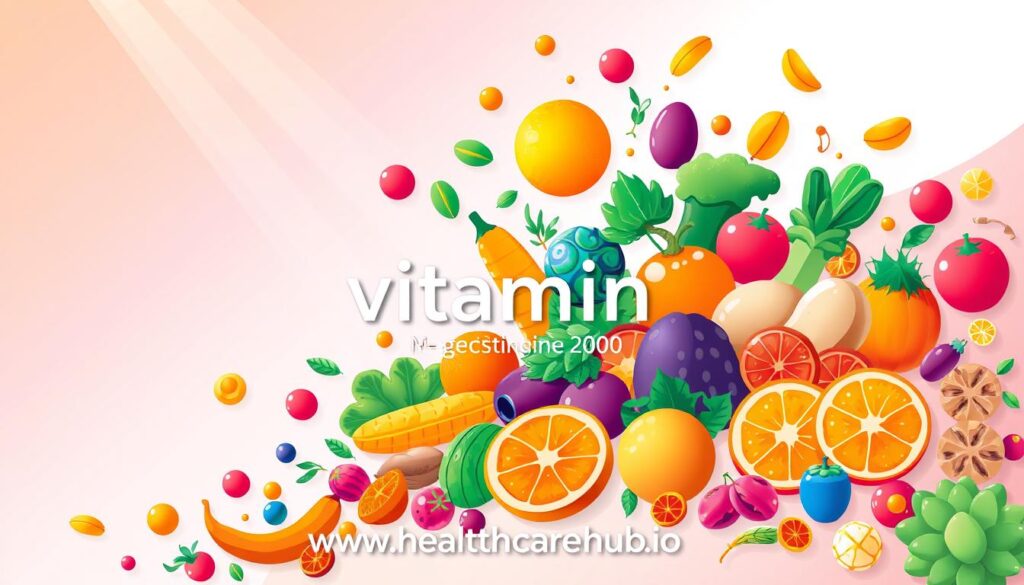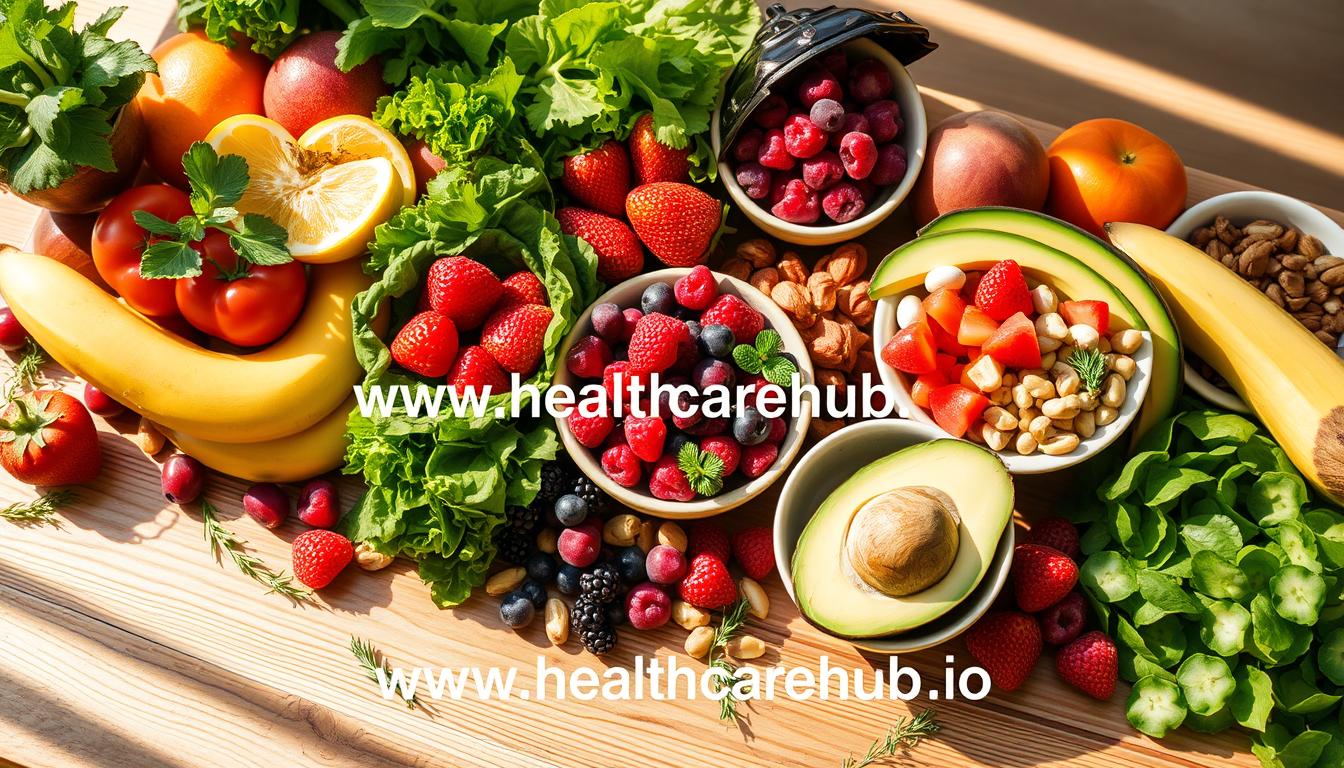Hippocrates once said, “Let food be thy medicine and medicine be thy food.” This quote highlights the role of vitamins and nutrition in health. Your body needs at least 13 essential vitamins to function well. Without them, you might face various health issues.
Vitamins, vitamin supplements, and the best vitamins are key to avoiding nutrient deficiencies. They support your overall health.
It’s vital to understand how vitamins work in your diet. The multibillion-dollar supplement industry grows as people seek quick health fixes. Knowing what makes the best vitamins and how to add them to your diet is important.
You can get optimal nutrition from a balanced diet rich in whole foods. Sometimes, vitamin supplements are needed to fill the gap.
Key Takeaways
- You require at least 13 essential vitamins for optimal health.
- Vitamins, vitamin supplements, and the best vitamins are key to avoiding nutrient deficiencies.
- A balanced diet with whole foods is essential for getting enough vitamins and minerals.
- Some groups might need more supplements, like those on special diets or with health issues.
- Most nutrients are better absorbed from whole foods than supplements.
- Talking to a healthcare professional can help find the right vitamins and supplements for you.
Understanding the Essential Role of Vitamins in Your Body
Vitamins are key to keeping you healthy. A vitamin deficiency can cause many health problems. There are 13 vitamins your body needs for normal functions, growth, and development. These vitamins are either fat-soluble (A, D, E, K) or water-soluble (C and B-complex).
Fat-soluble vitamins are stored in the liver, fatty tissues, and muscles. Water-soluble vitamins, on the other hand, are not stored and must be eaten daily.
The vitamin benefits are many. Eating a variety of foods can give you all the vitamins you need. But, some people might need supplements to get enough vitamins. It’s important to remember that too much of fat-soluble vitamins can be harmful.

- Fat-soluble vitamins (A, D, E, K) are stored in the liver, fatty tissue, and muscles.
- Water-soluble vitamins (C and B vitamins) are not stored in the body and must be consumed regularly.
- Vitamin D requirement: 10 to 15 minutes of sunshine, 3 times a week, is sufficient for most individuals at most latitudes to meet their vitamin D needs.
Getting enough vitamins is vital to avoid vitamin deficiency and health problems. The U.S. government has started fortifying foods like salt and grains with vitamins. This helps prevent issues like goiter and birth defects. Knowing how important vitamins are can help you stay healthy by ensuring you get the right amount.
Natural Food Sources for Maximum Vitamin Absorption
Getting the right vitamins is key, and natural foods are the best way to do it. Fruits, vegetables, and whole grains are packed with nutrients for health. While vitamin tablets can help, they shouldn’t be the only thing you rely on. A diet full of different foods gives you all the vitamins and minerals you need.
Citrus fruits are great for vitamin C, fatty fish for vitamin D, and dark leafy greens for vitamin K. Steaming these foods helps keep their nutrients. Also, adding healthy fats to veggies boosts the absorption of vitamins A, D, E, and K.
Here are some examples of natural food sources for different vitamins:
- Vitamin A: carrots, sweet potatoes, winter squash
- Vitamin B-6 and B-12: meat, poultry, fish, shellfish, eggs, and milk
- Vitamin C: papaya, citrus fruits, strawberries, bell peppers
- Vitamin D: fatty fish, fortified milk, eggs, and shiitake mushrooms

By eating natural foods and a balanced diet, you get all the vitamins and minerals for health. Remember, vitamin tablets are helpful, but a varied diet is essential.
Common Vitamin Deficiencies and Their Warning Signs
Vitamin deficiencies can happen for many reasons. These include eating too little, certain health issues, or needing more vitamins during pregnancy. Knowing the signs of a deficiency is key to avoiding serious health problems. You can fix a vitamin deficiency by eating better or taking vitamin pills.
Vitamin A, B12, and D deficiencies are common. They can cause mild issues like tiredness or serious problems like weak bones. If you notice hair loss, skin issues, or muscle weakness, see a doctor. They can help figure out what’s wrong and how to fix it.
At times, taking vitamin pills is needed to fill the gap in your diet. But, always talk to a doctor before starting any supplements. This ensures you get the right amount and type of vitamins. Knowing about vitamin deficiencies and their signs helps you stay healthy and well-nourished.
Smart Strategies for Optimal Vitamin Intake
To get the right amount of vitamins, you need a smart plan. Choosing vitamin supplements from trusted brands is key. They should meet quality standards and give your body what it needs.
Getting advice from a healthcare pro is also important. They can help figure out what vitamins you need based on your age, how active you are, and any health issues you might have.
Eating a variety of foods rich in nutrients is essential. Try to eat a mix of colorful fruits and veggies, whole grains, lean proteins, and healthy fats. This helps you get all the vitamins you need every day.
Simple changes can help a lot. For example, pick whole-grain bread instead of white bread. Or, choose nuts and seeds for snacks instead of junk food. These small changes can really boost your vitamin intake.
By following these smart tips, you can improve your vitamin levels. This supports your health and well-being. Start making these changes today. Small steps can lead to big improvements in your nutrition.














Leave a Reply